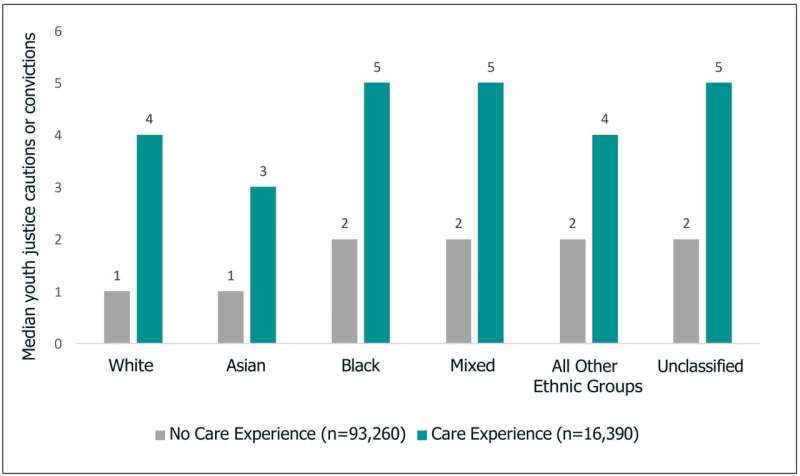This article has been reviewed according to Science X's editorial process and policies. Editors have highlighted the following attributes while ensuring the content's credibility:
fact-checked
trusted source
proofread
One in three children who've been in care system enter youth justice system, UK research shows

An unprecedented study of 2.3m children has found that one in three children born between 1996 and 1999 who had experience of the care system received a youth justice caution or conviction between the ages of 10 and 17, compared with just 4% of those without experience of care.
This figure was even higher for some ethnic groups, with a total of 39% of Black Caribbean, 38% of White and Black African and 42% of White and Black Caribbean children who'd been in care involved in the youth justice system.
Of all children in the study, custodial sentences were almost twice as common among Black and Mixed ethnicity children who'd been in care compared to White children who'd been in care.
The study found that 5% of White children who'd been in care received a custodial sentence—with 9% of Black and Mixed ethnicity children who'd been in care sentenced to custody.
Dr. Claire Fitzpatrick, Senior Lecturer in Criminology at Lancaster University and co-author of the report, said, "The findings from this research led by Dr. Katie Hunter are deeply concerning and ought to be taken very seriously. In particular, the extent of justice-system over-representation that has been revealed is shocking.
"This research demonstrates the importance of using more detailed ethnicity information when considering inequalities in youth justice involvement, particularly for those who have been in care. It highlights the serious need to ensure that all children can benefit from efforts at preventing unnecessary criminalization, no matter who they are or where they have come from."
The research, authored by Manchester Metropolitan University and Lancaster University, is the largest ever study of its kind in England, demonstrating that children who'd been in care—and particularly those who are Black—are statistically over-represented in the criminal justice system.
The report also emphasizes that high levels of youth justice involvement among children who've been in care are not an inevitability but a sign that somewhere along the line, they have been failed.
An Administrative Data Research UK Research Fellowship project, the study analyzed new linked data from the Ministry of Justice and Department for Education. It included four cohorts of children born between 1996 and 1999, with snapshot demographic information extracted from the 2006 to 2009 educational censuses when they were aged ten, the minimum age of criminal responsibility in England and Wales.
The resulting dataset contains information for approximately 2.3m children, comprising demographic information—including gender and ethnicity—information about children's services involvement and/or youth justice involvement. The data included 50,000 children who had experience of being in care including foster care, children's homes and kinship care.
Based on the report findings, the authors have outlined a series of policy recommendations, including improving the availability of linked data from the justice system and other government departments, the publication of data using detailed ethnicity categories, a statutory duty on local authorities to prevent unnecessary criminalization of children in care and care leavers, and promoting understanding across youth justice agencies of the needs of children who've been in care in order to improve support.
Dr. Katie Hunter, Lecturer in Criminology at Manchester Metropolitan University and lead author of the study, said, "As a result of this analysis, we now know the shocking extent of criminalization among care-experienced children in England. It also reveals what individuals working in the field have long suspected—that racially minoritized care-experienced children are especially vulnerable to youth justice involvement and imprisonment.
"Clearly, we need urgent action from government to prevent the unnecessary criminalization of children in care and care leavers which takes account of the specific needs of minoritized groups. We also need to keep in mind that youth justice involvement among children who've been in care is not an inevitability. We must avoid stigmatizing these children—this is about over-criminalization and system failures."
The report, Care Experience, Ethnicity and Youth Justice Involvement: Key Trends and Policy Implications, is authored by Dr. Katie Hunter at Manchester Metropolitan University, as well as Professor Brian Francis and Dr. Claire Fitzpatrick at Lancaster University.
More information: Report: www.adruk.org/fileadmin/upload … ing-Katie-Hunter.pdf
Provided by Lancaster University



















